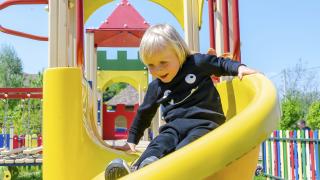National Project Supports State and Local Leaders with Inclusion of High Quality Family Child Care in Pre-K Systems

November 12, 2024
NEW BRUNSWICK, N.J.— Nationwide, teams from four states - Alabama, North Carolina, Michigan, and Nevada - have been tapped to participate in a new initiative aimed at supporting the integration of Family Child Care (FCC) educators into state- and city-funded pre-K programs with high standards, making early childhood education more inclusive for families.
The Alabama Department of Early Childhood Education, Early Years, Triangle Area Child Care Resource and Referral, and Durham Pre-K; Michigan Department of Lifelong Education, Advancement and Potential; and the Nevada Children’s Cabinet have joined the inaugural cohort of the Enriching Public Pre-K Through Inclusion of Family Child Care (EPIC FCC) initiative, facilitated by the National Institute of Early Education Research and in partnership with Home Grown. This initiative seeks to support state, city, county, and tribal government leaders interested in expanding the participation of Family Child Care (FCC) educators in their pre-K systems or engaging FCC educators in these pre-K systems for the first time.
The percentage of children in the United States enrolled in state-funded preschool programs reached an all-time high in the 2022-2023 school year, with 35% of four-year-olds and 7% of three-year-olds enrolled. However, despite these efforts to expand state-funded programs, many children still lack access to publicly funded preschool, and most importantly, many lack access to a high-quality program.
States have expanded their pre-K systems in variety of settings including public schools, child care centers, and Family Child Care homes. Millions of families rely on home-based care settings in the U.S., and more than 750,000 children are cared for in Family Child Care (home-based settings regulated or certified by the state). These programs are more likely to be in large urban areas with high concentrations of poverty and a higher percentage of children from minority and non-English speaking backgrounds.
“We are excited to work with states and localities interested in considering FCC inclusion in their mixed-delivery systems. When states incorporate high standards and fund programs to support quality across different settings, high-quality mixed-delivery systems provide families with choices that meet their needs.” said Erin Harmeyer, an assistant research professor at NIEER.
For the past two years, Home Grown has invested in research and policy analysis to support the inclusion of Family Child Care programs in state- and city-funded pre-K initiatives with both the National Institute of Early Education Research and the Pre-K In FCC Team, which includes the Erikson Institute, University of Delaware, and the Equity Action Research Coalition at the UNC Frank Porter Graham Child Development Institute. This work led to the development of a framework that state and city leaders could implement when FCC educators participate in their pre-K programs.
Over the next several months, cohort members will participate in a peer learning community with fellow state and local government agencies on this framework, including topics such as program design and pre-K program standards, pre-K supports, equitable financing, and state/local public sector oversight and governance. Additionally, each member will receive technical assistance from the National Institute on Early Education Research and gain access to guidance documents and resources, including implementation plans, a compendium of programs, and toolkits. Cohort members will also be eligible for flexible planning grants of $25,000 to support implementation.
The EPIC FCC is made possible through generous funding from the Annie E. Casey Foundation and the Esther A. & Joseph Klingenstein Fund to Home Grown.
About NIEER
The National Institute for Early Education Research (NIEER) at the Graduate School of Education, Rutgers University, New Brunswick, NJ, conducts and disseminates independent research and analysis to inform early childhood education policy.
